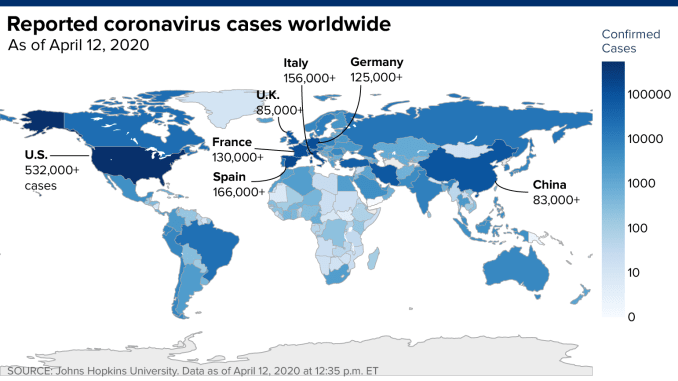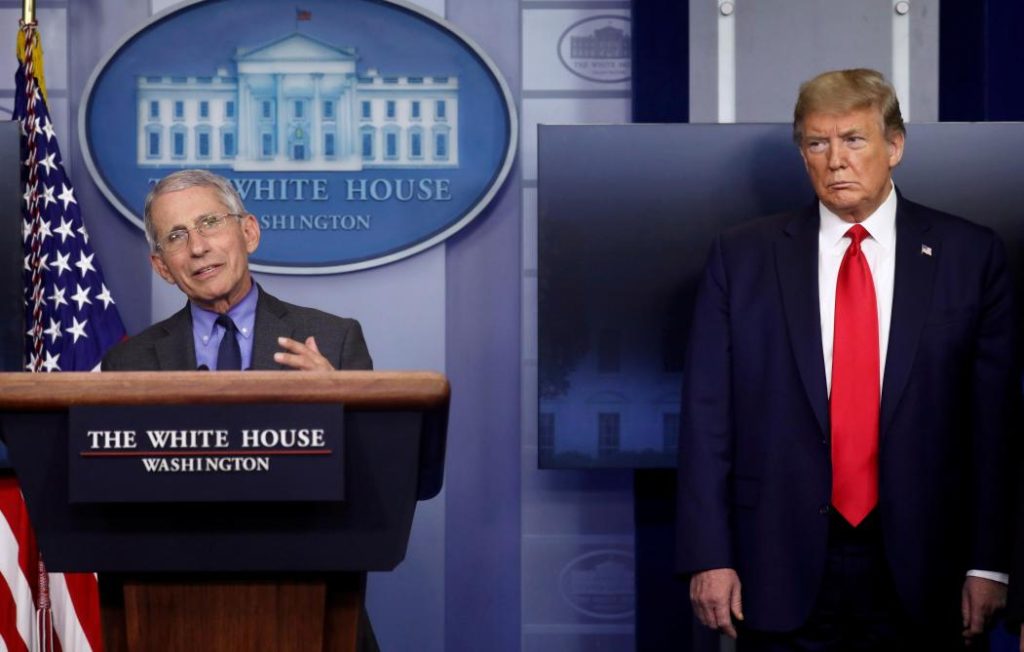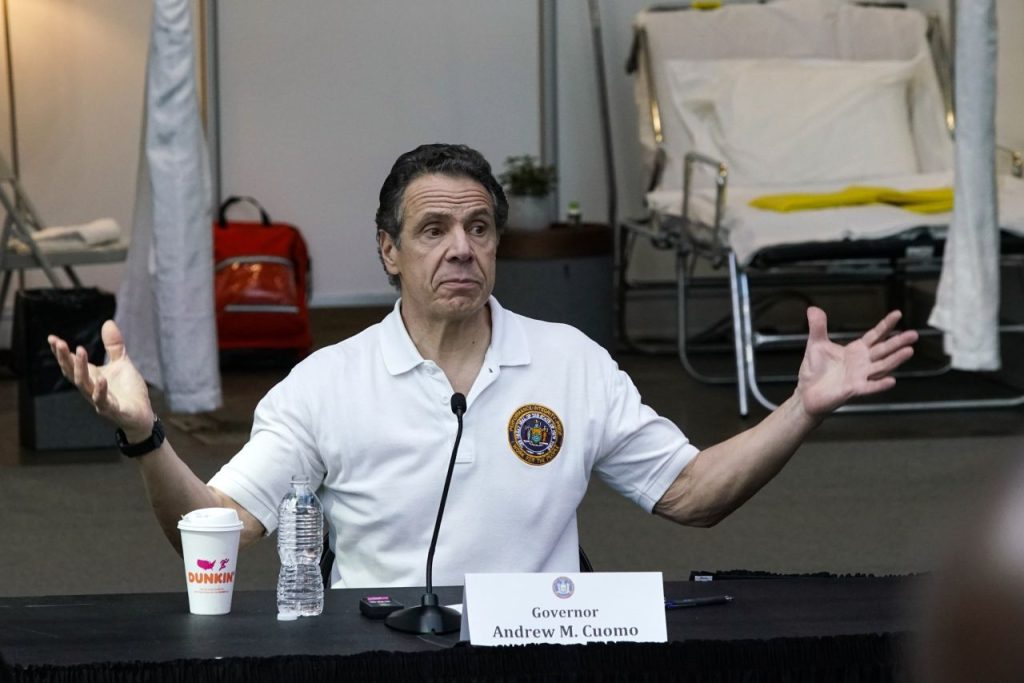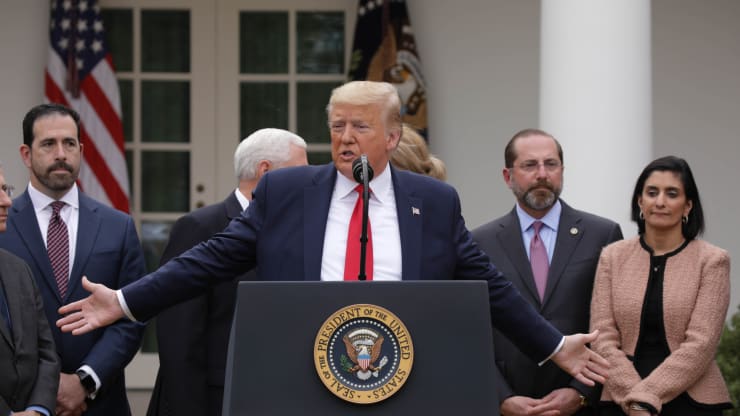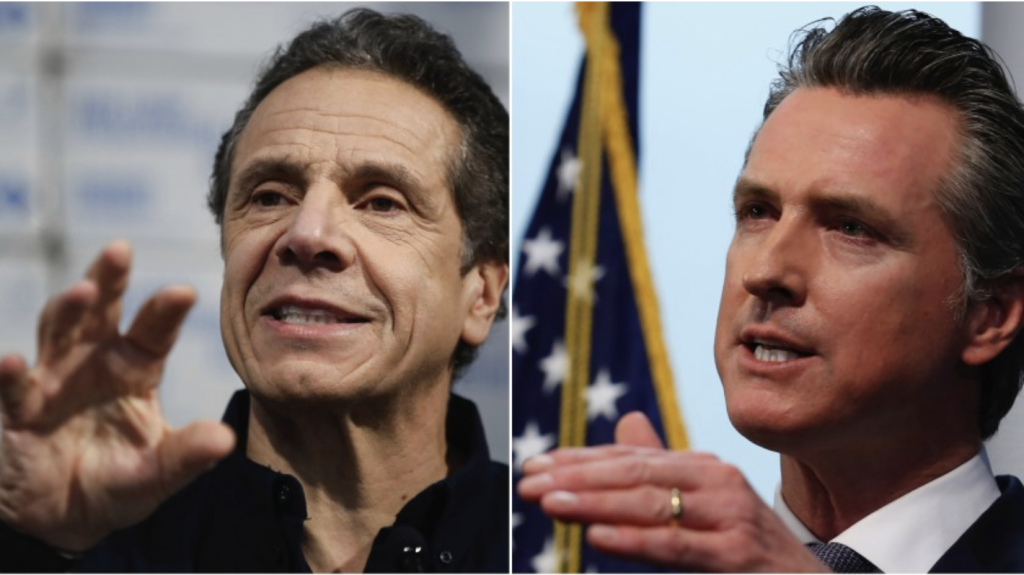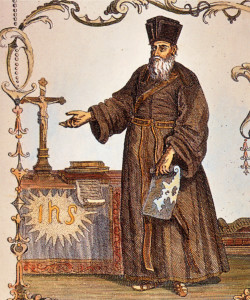27/04/2020
Fauci, Cuomo, Trump: three Jesuit Alumni, three different ways of dealing with the coronavirus crisis in the land of Uncle Sam
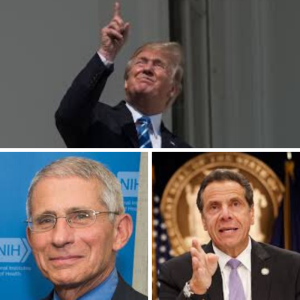
The United States is now the world’s most affected country by Covid-19 (at the time of writing these lines, there have been nearly 890,000 infections, more than 50,000 deaths and more than 85,000 recoveries). This inexorably focuses the eyes from all over the world to the way this unprecedented crisis is handled as well as highlights the actions of three key people, all from the ranks of Jesuit institutions : Donald Trump (Fordham, ’66), president of the country since January 2017 and seeking re-election next November; Andrew Cuomo (Fordham, ’79), governor of New York State since January 2011 and already re-elected twice; Anthony Fauci (College of the Holy Cross, ’62), director of the National Institute of Allergy and Infectious Diseases. Although all three are graduates of prestigious Jesuit institutions, their personal magis, different careers and positions lead to disagreements between them, some of them being profound.
World map showing the countries most affected by the Coronavirus as of 12/04/2020 – © Johns Hopkins University
Due to its turbulent history, which determined the structure of its Constitution based on great principles such as the unconditional guarantee of freedoms as well as the due process and equal protection clauses, the country has adopted a political and administrative system, which is unique in the world. In this regard, Articles II (executive power) and IV (rights and obligations of States) are of particular interest to us.
The reason we mention the U.S. Constitution in the preamble is that it is complicated to understand what follows without having in mind the spirit of the laws that govern the American nation and the great principles that have governed it since its independence. In addition, we will try to highlight the actions of the President of the United States and those of the Governor of the most affected state by the crisis, which can only be measured in terms of what they can actually do. Beyond simply opposing the quasi-caricatured figures of Donald Trump and Andrew Cuomo, tempered by the arbiter of elegance embodied by Anthony Fauci, the whole point of putting these three actors into perspective lies in highlighting the strengths and weaknesses of the American administrative system itself.
Anthony Fauci, Director of the National Institute of Allergy and Infectious Diseases ; Andrew Cuomo, 56th New York Governor ; Donald J. Trump, 45th President of the United States of America
Donald J. Trump seems to have made a complete about-face from the deliberately stringy statements he was fond of making in recent weeks, swinging sometimes towards a strong response [1], sometimes towards a more neutral one, worrying more about the impact on the economy than about the actual progression of the virus. It was for once a president of all Americans who was found at the White House last Sunday, April 19, declaring “I’m here for everyone”, regardless of state, whether it is governed by a Republican or a Democrat, as he once liked to do.
The reason? It is to be found in the harangue of two other men of great importance in this deep American crisis who are now acting as firewalls against a virus that is claiming victims across the Atlantic (more than 50,000 dead as we write this). On the one hand, we have Andrew Cuomo, Governor of New York State, the state from which the epidemic originated on North American soil[2] and which has by far the highest number of people infected and dead. On the other is Anthony Fauci, Director of the National Institute of Allergy and Infectious Diseases, who, throughout this crisis, is assisting the President of the United States in a crisis cell in the famous “Situation Room” of the White House, providing him with detailed reports on the progression of the virus and giving him in-depth analyses from his many years of experience[3].
Anthony Fauci (left), appointed by Donald J. Trump (right) Director of the White House Coronavirus Task Force, presenting one of his daily bulletins to the press – © Reuters 2020
Dr. Anthony Fauci has repeatedly quoted President Trump on some of his statements. While they meet almost daily within the presidential “Coronavirus task force” where Dr. Anthony Fauci, it has been said, occupies a place of paramount importance, it is every night that the 79-year-old doctor informs his fellow citizens on the evolution of the situation, giving information that sometimes contradicts the president’s ones. While the role of a president is to reassure the nation in the event of a crisis, President Trump was mildly optimistic in early March that the Covid-19 vaccine could be available within four months. An announcement that was instantly corrected by Dr. Fauci: “As I told you, Mr. President, it will take a year to a year and a half to distribute an effective and safe vaccine. Another anecdote that will make some people laugh – and others wince – is the one in which, at Donald J. Trump’s press conference on March 20, 2009, which was broadcast on the MSNBC news channel, Dr. Fauci stood behind him, released a disapproving grin and then hid his face in his hand, which was then broadcast on social networks.
In an interview in ScienceInsider, Dr. Fauci looks back on his relationship with the White House, with an honest impartiality that it is good here to relay. First of all, while he laughs happily with the ScienceInsider interlocutor to whom he says “I’m fine, I haven’t been fired yet”, Anthony Fauci explains the reason : “even if we disagree on certain issues, he listens. He goes his own way. He has his own style. But on important issues, he really listens to what I have to say.” He also makes it clear, in relation to what could legitimately have been considered a jousting match through speeches in their respective briefings, that what the President expresses “is said in a way that I would not have used, because that could give a misunderstanding of what the facts are in relation to a particular subject; that is not why I am opposed to it in substance”. On one issue in particular, President Trump made a questionable exit, calling into question China’s responsibility to warn the world about the presence of this virus much earlier than the country did it. It is understandable for a president of a nation to lack objectivity when his country is under attack and to retaliate by counterattacking on the responsibility of everyone to adopt. Anthony Fauci, who is not bound by any subjectivity related to his office, comments on the anecdote in the following way: “You should tell the president the next time we sit down together.” By the way, Mr. President, be careful with this, don’t say that,” but I can’t jump on the microphone and knock him down. Okay, he said it. Let’s try and make it right for next time”.
One person who can afford to be completely subjective and, like Trump, must defend his political interests and the “nation” he leads[4] is the Governor of New York State, the original source of the epidemic, Andrew Cuomo. Born in New York City in 1957 and an alumnus of Fordham, Andrew Cuomo served as US Secretary of Housing and Urban Development between 1997 and 2001, under President Bill Clinton, and then as State Attorney General from 2007 to 2010. Since 2011, he is the 56th governor of the Empire State (re-elected in 2014 and 2018). While heading the most affected state in the country, Andrew Cuomo is much more virulent towards the President of the United States on two key points.
Andrew Cuomo at a crisis press conference in New York at the end of March 2020 – © AFP 2020
The first point is whether to quarantine states. Taking a comprehensive national view, Trump is in favor of quarantining states, at a time when, for example, many New Yorkers are leaving their state to go to their second Florida residence (Trump himself, a New Yorker, is no exception to the rule with his winter residence in Mar-A-Lago, West Palm Beach, Florida), carrying with them a possible risk of contagion. While the White House tenant was still thinking Saturday, March 28, of quarantining the states of New York, New Jersey and Connecticut (which alone account for more than half of the cases and nearly half of the deaths), according to a favorable opinion from Dr. Anthony Fauci, who said a 14-day national containment would be a good thing, Andrew Cuomo the next day urged him to let Governors decide whether to quarantine their states, saying that imposing quarantine would be illegal and would be perceived as a “declaration of war”, which the latter finally conceded to him, the same day after consulting the task force headed by Dr. Anthony Fauci! Donald J. Trump, although having declared the quarantine “at the end not necessary” did not hesitate, however, to split a tweet, as usual, where he declared that “instead of quarantine, the Center for Disease Control and Prevention (CDC) will issue a “strong travel advisory” for the above-mentioned States”.
The second point is the fact that, with the 2020 presidential elections in the spotlight, both are trying to come out into the light as the savior of the nation. The Democratic Party, whose primaries ran short, without really convincing, wondered for a while whether Andrew Cuomo, who had proved to be the number one contender in Trumpian politics over Covid-19, would not also have been, on a more global scale, next November; a hypothesis that others have been quick to sweep, stating that while the corruption cases of which Andrew Cuomo is suspected decided him not to run a few months ago, this should not change now. For NBC News, Andrew Cuomo is the real leader of the moment, having congratulated himself for taking the lead in declaring the closure of “non-essential offices and stores” as of Sunday, March 22, and declaring “if you want to blame someone, blame me! There is no one else responsible for this decision,” deliberately contrasting with President Trump’s famous “I am absolutely not responsible” that he had declared a few days earlier, on Friday, March 13, 2020, in the Rose Garden of the White House. Lis Smith, a Democratic strategist who advised Cuomo in the campaign for his re-election in 2018, added: “Briefings from both Washington and Albany in recent weeks show that there is a divergence in leadership. Where Governor Cuomo is straightforward, blunt, factual and in control at all times, the President is attacking the media, sowing confusion and constantly shirking his responsibility. (…) There is a lot of fear and uncertainty. People want a leader. They want facts, and they also want to know that even though the times may not be easy, we will get there. (…) Governor Cuomo offers a sense of calm and temperance — the president doesn’t.” It’s a bit quick, forgetting that in terms of health and police management, the president of the United States, following the Constitution, has no say. The most he can do is send in the National Guard, but only if a state has requested it in advance. Can an incumbent president be criticized for respecting the Constitution? Is that not one of the first conditions for his election?
Donald J. Trump declares a state of national emergency due to coronavirus in the White House Rose Garden on March 13, 2020 – © Getty Images 2020
Between Trump and Cuomo, it’s a bit like “I love you, me neither”; all the more so because, whatever appearances may suggest, each is largely dependent on the other’s results. If Andrew Cuomo had thanked Trump a few weeks ago for his cooperation, defining the crisis as a “common challenge”, other traces of cordial agreement between the two fronts are becoming rarer. Andrew Cuomo did not hesitate, as early as Tuesday, March 24, to declare that thousands of New Yorkers would die if President Trump and the federal executive did not bring the respirators they had promised. Capitalizing on his role as the savior of New York, Andrew Cuomo added this Sunday: ” New York will get what it needs. And no one will attack New York unfairly and no one will stop New York from getting what it needs. Already during his press conference on Sunday, March 22, in Albany, he was directly targeting the federal government: “I think the federal government should order factories to make masks, gowns, respirators, essential medical equipment, everything that will make the difference between life and death”. On March 13, Donald Trump resigned himself to declaring a state of emergency. Does this mean that the president can now interfere in the governance of a state? Certainly not! He can simply allow resources to be allocated to assist federal and local authorities, who alone decide whether the federal government will interfere.
As we can see, tensions increased as the number of cases detected, and deaths increased. And reactions became increasingly tense, with two giants of American politics, both from the same Jesuit university, both committed to dealing with the issues for which they are responsible on two different scales, making their reactions logically different. It is interesting to show that since the curve has been reversed, a relaxation in the messages of the different protagonists has begun. At his press conference on April 14, 2020, Donald Trump presented a video montage in which he shows different personalities who criticized him at the beginning of the crisis, today thanking him for the help he was able to unblock by declaring a state of national emergency. Among them are California, Gavin Newsom, another Jesuit alumnus (University of Santa Clara, ads 1989), and New York, Andrew Cuomo, Democratic Governors who last week (https://www.foxnews.com/politics/trump-coronavirus-testing-milestone-ppp-small-business) praised the Trump administration’s response to the coronavirus crisis and “the extraordinary efforts and mobilization” that the federal government has made and in which it has been a major partner. “We needed help and they responded,” the New York Governor said, adding that those who died could not be saved. Newsom said, “Let me be honest with you. I would be lying to you if I told you that Trump did not meet our needs. He did. And, as a guarantee of objectivity, I have to admit it publicly.”
New York Governor Andrew Cuomo (left) and California Governor Gavin Newsom (right) – © Associated Press
Whether the crisis is the same for everyone, the measure of decisions is not the same when one governs a particular state or all of them. In the United States, the line is sometimes porous and often blurred between state responsibility and the interference that the federal structure can afford to adopt regarding the states. Donald J. Trump’s skill lies in knowing how to surround himself with and listen to another brilliant and competent Jesuit elder, Dr Anthony Fauci, director of NIAID and head of the White House’s Coronavirus Task Force, who advises him on a daily basis and does not hesitate to disagree with him on certain subjects[5], or even to intercede with the President to let Governor Andrew Cuomo act on his territory as a good father. If, in the end, everyone has a heavy task to accomplish in this unprecedented crisis for the country with the starred banner, it does not ultimately matter how each one does it, as long as, in the end, the American people do not lose out – which is far from being obvious. At the moment at least, the storm seems to be passing as the curve begins to turn, despite the number of daily deaths that are still in the hundreds. A lull, which may only be the eye of the storm, because, although Donald Trump can now afford to catch his breath, his re-election is not yet assured. He, who asked to be judged primarily on his economic balance sheet – at first glance, not so bad – risks losing feathers in the home stretch when it comes to the final post-crisis coronavirus assessment. Unemployment, which had reached an all-time low before the crisis by falling to 3.5% – a figure that the United States had not seen since the Glorious Thirties – has already risen to 4.4% and continues to climb, with the number of unemployed rising by 3 million a week. The fall in stock market values and GDP is also expected with increasing apprehension. All this could contribute to a growing risk of riots, as the people most affected by economic crises are those who are already disadvantaged at the grassroots level and, moreover, the most prone to catch the virus, powerless in the face of a free private insurance market praised by Donald Trump. However, while the latter argument can be reproached to him, it is more complicated to accuse him of relative passivity, given that, on the one hand, the counties most affected are those historically managed by democrats and that, on the other hand, an incumbent president cannot be reproached for strictly adhering to the sacrosanct Constitution, since health or police matters – to enforce the famous containment – are strictly a matter for the law of the federated states.
Maurice Selvais
Content editor
[1] The United States was the first country to react so quickly to the crisis when, on March 12, when the WHO officially described the epidemic as a pandemic, President Trump ordered the closure of American airspace to 26 European countries (Editor’s note: The United States was the first country to react so quickly to the crisis: the same ban had already been in effect since February 2 for flights from China; at the time, no cases had yet been detected on American soil), called on Congress to quickly adopt a reduction in payroll taxes to help American households overcome the economic impact of the epidemic and announced the postponement of the deadline for payment of taxes for certain individuals and companies.)
[2] According to The New York Times, the starting point of the epidemic is New Rochelle, a suburb of New York City, not far from the border with Connecticut.
[3] Appointed head of NIAID in 1984, Anthony Fauci has served loyally and professionally every U.S. president since Ronald Reagan. He is recognized for his work in immunology, particularly in the evolution of the AIDS virus, which he has helped to better understand and therefore better contain. The National Catholic Reporter tells us that the two presidents Fauci enjoyed working with most were both Presidents Bush: “He describes Reagan’s successor, George H. W. Bush, as extraordinary, noting that while he was vice president, Bush visited Fauci’s AIDS patients.” He said that his son, President George W. Bush, helped him save 14 million lives from AIDS in Africa by developing a program to distribute drugs to fight the disease. Fauci received the Presidential Medal of Freedom, the highest honor in the United States, from George W. Bush. Modest, Fauci acknowledges that only the president was responsible for this program, which does not detract from Dr. Fauci’s merit.
[4] The term “nation” used here is deliberately exaggerated, even though, with a population of 20 million (the fourth most populous state in the country) and a GDP equivalent to that of Turkey, New York State’s statistics can be easily compared to those of an independent country. This makes Andrew Cuomo’s responsibility all the more important.
[5] In particular on the use of chloroquine, which Donald Trump wanted at all costs to provide free of charge and without delay to anyone who asked for it, and which Anthony Fauci declared to be dubious and lacking the curative properties that Donald Trump lent him. Only time will tell who was right, but the facts seem to prove Fauci right.
The contents of this article do not necessarily reflect the views of the World Union of Jesuit Alumni.


